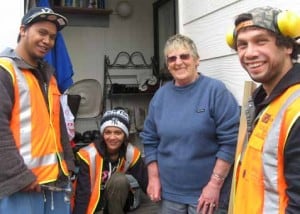
Building new steps for kaumätua housing on Waimarama marae.
From left, Kootirangi Tamatea, Riria Moanaroa, kuia and marae resident
Christine August and Chelton Walker.
A joint initiative launched by EIT and iwi is proving an unqualified success in providing Māori trades training on local marae.
The first phase in the scheme – a 19-week, full-time, Level 2 construction programme based at Hastings Waipatu marae achieved a 100 percent pass rate.
Eleven students progressed to EIT’s Certificate in Carpentry, a 33-week fulltime pre-trades programme offered on the Waimarama marae in partnership with Te Whare Tapere o Takitimu. Of the others who completed the original programme, one secured an apprenticeship, another a job and two moved into other areas of study.
Six Waimarama students also joined the Level 3 pre-trades programme which sees them undertaking practical projects on the marae – constructing new timber steps for entrances to kaumātua housing, replacing substandard windows, building covered shelters over marae seating, upgrading the kitchen and extending the hauora (health) facility.
“We aim to make the learning as close to real life as possible,” says tutor Jack Pritchard, who was Top Pre-trades Carpentry Student in the 2011 Greenmeadows Rotary and EIT Hawke’s Bay Apprentice Awards.
Covering aspects of construction such as tools, building legislation, sustainability and durability, the marae-based classes also encompass literacy and numeracy. All the students aim to secure apprenticeships.
Head of School of Trades and Technology Todd Rogers says the programmes also help EIT expand its relationship with iwi as part of the preparations underway for Te Matatini,
the national kapa haka competition to be held in Hawke’s Bay in 2017.
“One of the benefits of the pre-trades training is that the practical projects assist marae in improving facilities for hosting visitors from outside the region.”
“They have an unbreakable bond,” Jack says of his students’ commitment to supporting one another and their marae while also working towards qualifications.
